Fleurs du Mal Magazine


Or see the index
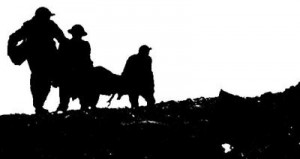
Edward Thomas
(1878 – 1917)
As the team’s head brass
As the team’s head brass flashed out on the turn
The lovers disappeared into the wood.
I sat among the boughs of the fallen elm
That strewed an angle of the fallow, and
Watched the plough narrowing a yellow square
Of charlock. Every time the horses turned
Instead of treading me down, the ploughman leaned
Upon the handles to say or ask a word,
About the weather, next about the war.
Scraping the share he faced towards the wood,
And screwed along the furrow till the brass flashed
Once more.
The blizzard felled the elm whose crest
I sat in, by a woodpecker’s round hole,
The ploughman said. ‘When will they take it away?’
‘When the war’s over.’ So the talk began –
One minute and an interval of ten,
A minute more and the same interval.
‘Have you been out?’ ‘No.’ ‘And don’t want to, perhaps?’
‘If I could only come back again, I should.
I could spare an arm. I shouldn’t want to lose
A leg. If I should lose my head, why, so,
I should want nothing more….Have many gone
From here?’ ‘Yes.’ ‘Many lost?’ ‘Yes, a good few.
Only two teams work on the farm this year.
One of my mates is dead. The second day
In France they killed him. It was back in March,
The very night of the blizzard, too. Now if
He had stayed here we should have moved the tree.’
‘And I should not have sat here. Everything
Would have been different. For it would have been
Another world.’ ‘Ay, and a better, though
If we could see all all might seem good.’ Then
The lovers came out of the wood again:
The horses started and for the last time
I watched the clods crumble and topple over
After the ploughshare and the stumbling team.
Edward Thomas poetry
fleursdumal.nl magazine
More in: Archive S-T, Thomas, Edward
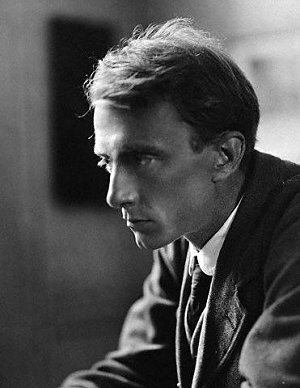
Edward Thomas
(1878–1917)
Like the Touch of Rain
Like the touch of rain she was
On a man’s flesh and hair and eyes
When the joy of walking thus
Has taken him by surprise:
With the love of the storm he burns,
He sings, he laughs, well I know how,
But forgets when he returns
As I shall not forget her ‘Go now’.
Those two words shut a door
Between me and the blessed rain
That was never shut before
And will not open again.
Edward Thomas poetry
fleursdumal.nl magazine
More in: Archive S-T, Thomas, Edward
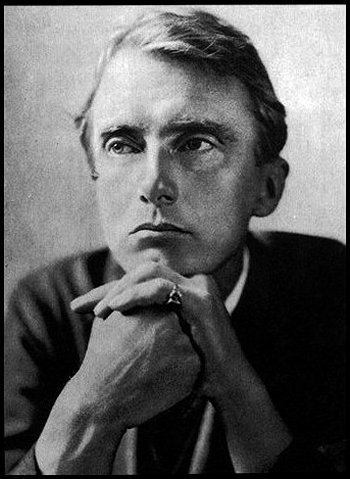
EDWARD THOMAS
(1878-1917)
O c t o b e r
The green elm with the one great bough of gold
Lets leaves into the grass slip, one by one, —
The short hill grass, the mushrooms small milk-white,
Harebell and scabious and tormentil,
That blackberry and gorse, in dew and sun,
Bow down to; and the wind travels too light
To shake the fallen birch leaves from the fern;
The gossamers wander at their own will.
At heavier steps than birds’ the squirrels scold.
The rich scene has grown fresh again and new
As Spring and to the touch is not more cool
Than it is warm to the gaze; and now I might
As happy be as earth is beautiful,
Were I some other or with earth could turn
In alternation of violet and rose,
Harebell and snowdrop, at their season due,
And gorse that has no time not to be gay.
But if this be not happiness, — who knows?
Some day I shall think this a happy day,
And this mood by the name of melancholy
Shall no more blackened and obscured be.
Edward Thomas: October
fleursdumal.nl magazine
More in: Archive S-T, Thomas, Edward
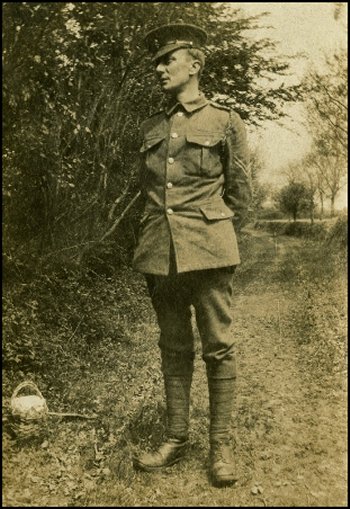
Edward Thomas
(1878–1917)
Like the Touch of Rain
Like the touch of rain she was
On a man’s flesh and hair and eyes
When the joy of walking thus
Has taken him by surprise:
With the love of the storm he burns,
He sings, he laughs, well I know how,
But forgets when he returns
As I shall not forget her ‘Go now’.
Those two words shut a door
Between me and the blessed rain
That was never shut before
And will not open again.
Edward Thomas poetry
kempis.nl poetry magazine
More in: Archive S-T, Thomas, Edward
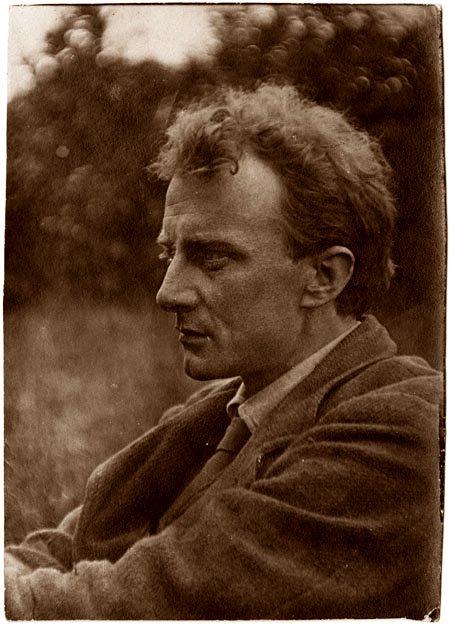
E d w a r d T h o m a s
(1878-1917)
W O R D S
That make rhymes,
Will you choose
Sometimes —
As the winds use
A crack in a wall
Or a drain,
Their joy or their pain
To whistle through —
Choose me,
You English words?
I know you:
You are light as dreams,
Tough as oak,
Precious as gold,
As poppies and corn,
Or an old cloak:
Sweet as our birds
To the ear,
As the burnet rose
In the heat
Of Midsummer:
Strange as the races
Of dead and unborn:
Strange and sweet
Equally,
And familiar,
To the eye,
As the dearest faces
That a man knows,
And as lost homes are:
But though older far
Than oldest yew, —
As our hills are, old, —
Worn new
Again and again:
Young as our streams
After rain:
And as dear
As the earth which you prove
That we love.
Make me content
With some sweetness
From Wales
Whose nightingales
Have no wings, —
From Wiltshire and Kent
And Herefordshire,
And the villages there, —
From the names, and the things
No less.
Let me sometimes dance
With you,
Or climb
Or stand perchance
In ecstasy,
Fixed and free
In a rhyme,
As poets do.
Edward Thomas: Words
k e m p i s p o e t r y m a g a z i n e
More in: Thomas, Edward
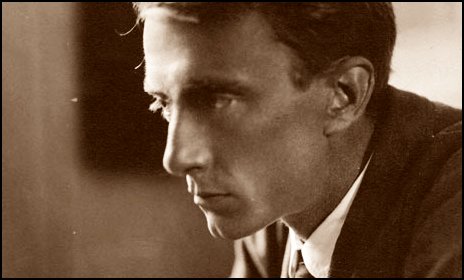
Edward Thomas
(1878-1917)
The Other
The forest ended. Glad I was
To feel the light, and hear the hum
Of bees, and smell the drying grass
And the sweet mint, because I had come
To an end of forest, and because
Here was both road and inn, the sum
Of what’s not forest. But ’twas here
They asked me if I did not pass
Yesterday this way. ‘Not you? Queer.’
‘Who then? and slept here?’ I felt fear.
I learnt his road and, ere they were
Sure I was I, left the dark wood
Behind, kestrel and woodpecker,
The inn in the sun, the happy mood
When first I tasted sunlight there.
I travelled fast, in hopes I should
Outrun that other. What to do
When caught, I planned not. I pursued
To prove the likeness, and, if true,
To watch until myself I knew.
I tried the inns that evening
Of a long gabled high-street grey,
Of courts and outskirts, travelling
And eager but a weary way,
In vain. He was not there. Nothing
Told me that ever till that day
Had one like me entered those doors,
Save once. That time I dared: ‘You may
Recall’ — but never-foamless shores
Make better friends than those dull boors.
Many and many a day like this
Aimed at the unseen moving goal
And nothing found but remedies
For all desire. These made not whole;
They sowed a new desire, a kiss
Desire’s self beyond control,
Desire of desire. And yet
Life stayed on within my soul.
One night in sheltering from the wet
I quite forgot I could forget.
A customer, then the landlady
Stared at me. With a kind of smile
They hesitated awkwardly:
Their silence gave me time for guile.
Had anyone called there like me,
I asked. It was quite plain the wile
Succeeded. For they poured out all.
And that was naught. Less than a mile
Beyond the inn, I could recall
He was like me in general.
He had pleased them, but I less.
I was more eager than before
To find him out and to confess,
To bore him and to let him bore.
I could not wait: children might guess
I had a purpose, something more
That made an answer indiscreet.
One girl’s caution made me sore,
Too indignant even to greet
That other had we chanced to meet.
I sought then in solitude.
The wind had fallen with the night; as still
The roads lay as the ploughland rude,
Dark and naked, on the hill.
Had there been ever any feud
‘Twixt earth and sky, a mighty will
Closed it: the crocketed dark trees,
A dark house, dark impossible
Cloud-towers, one star, one lamp, one peace
Held on an everlasting lease:
And all was earth’s, or all was sky’s;
No difference endured between
The two. A dog barked on a hidden rise;
A marshbird whistled high unseen;
The latest waking blackbird’s cries
Perished upon the silence keen.
The last light filled a narrow firth
Among the clouds. I stood serene,
And with a solemn quiet mirth,
An old inhabitant of earth.
Once the name I gave to hours
Like this was melancholy, when
It was not happiness and powers
Coming like exiles home again,
And weaknesses quitting their bowers,
Smiled and enjoyed, far off from men,
Moments of everlastingness.
And fortunate my search was then
While what I sought, nevertheless,
That I was seeking, I did not guess.
That time was brief: once more at inn
And upon road I sought my man
Till once amid a tap-room’s din
Loudly he asked for me, began
To speak, as if it had been a sin,
Of how I thought and dreamed and ran
After him thus, day after day:
He lived as one under a ban
For this: what had I got to say?
I said nothing. I slipped away.
And now I dare not follow after
Too close. I try to keep in sight,
Dreading his frown and worse his laughter.
I steal out of the wood to light;
I see the swift shoot from the rafter
By the inn door: ere I alight
I wait and hear the starlings wheeze
And nibble like ducks: I wait his flight.
He goes: I follow: no release
Until he ceases. Then I also shall cease.
Edward Thomas: The Other

kempis poetry magazine
More in: Thomas, Edward
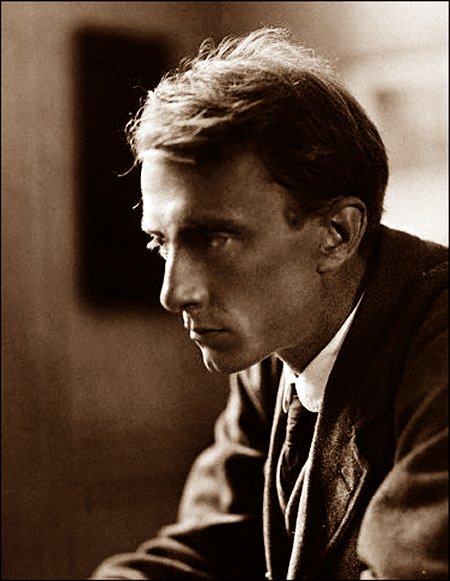
E d w a r d T h o m a s
(1878-1917)
Five Poems
A Tale
There once the walls
Of the ruined cottage stood.
The periwinkle crawls
With flowers in its hair into the wood.
In flowerless hours
Never will the bank fail,
With everlasting flowers
On fragments of blue plates, to tell the tale.
But these things also
But these things also are Spring’s —
On banks by the roadside the grass
Long-dead that is greyer now
Than all the Winter it was;
The shell of a little snail bleached
In the grass; chip of flint, and mite
Of chalk; and the small bird’s dung
In splashes of purest white:
All the white things a man mistakes
For earliest violets
Who seeks through Winter’s ruins
Something to pay Winter’s debts,
While the North blows, and starling flocks
By chattering on and on
Keep their spirits up in the mist,
And Spring’s here, Winter’s not gone.
As the team’s head-brass
As the team’s head-brass flashed out on the turn
The lovers disappeared into the wood.
I sat among the boughs of the fallen elm
That strewed the angle of the fallow, and
Watched the plough narrowing a yellow square
Of charlock. Every time the horses turned
Instead of treading me down, the ploughman leaned
Upon the handles to say or ask a word,
About the weather, next about the war.
Scraping the share he faced towards the wood,
And screwed along the furrow till the brass flashed
Once more.
The blizzard felled the elm whose crest
I sat in, by a woodpecker’s round hole,
The ploughman said. ‘When will they take it away?’
‘When the war’s over.’ So the talk began –
One minute and an interval of ten,
A minute more and the same interval.
‘Have you been out?’ ‘No.’ ‘And dont’want to, perhaps?’
‘If I could only come back again, I should.
I could spare an arm. I shouldn’t want to lose
A leg. If I should lose my head, why, so,
I should want nothing more. Have many gone
From here?’ ‘Yes.’ ‘Many lost?’ ‘Yes, a good few.
Only two teams work on the farm this year.
One of my mates is dead. The second day
In France they killed him. It was back in March,
The very night of the blizzard, too. Now if
He had stayed here we should have moved the tree.’
‘And I should not have sat here. Everything
Would have been different. For it would have been
Another world.’Ay, and a better, though
If we could see all all might seem good.’ Then
The lovers came out of the wood again:
The horses started and for the last time
I watched the clods crumble and topple over
After the ploughshare and the stumbling team.
Liberty
The last light has gone out of the world, except
This moonlight lying on the grass like frost
Beyond the brink of the tall elm’s shadow.
It is as if everything else had slept
Many an age, unforgotten and lost —
The men that were, the things done, long ago,
All I have thought; and but the moon and I
Live yet and here stand idle over a grave
Where all is buried. Both have liberty
To dream what we could do if we were free
To do some thing we had desired long,
The moon and I. There’s none less free than who
Does nothing and has nothing else to do,
Being free only for what is not to his mind,
And nothing is to his mind. If every hour
Like this one passing that I have spent among
The wiser others when I have forgot
To wonder whether I was free or not,
Were piled before me, and not lost behind,
And I could take and carry them away
I should be rich; or if I had the power
To wipe out every one and not again
Regret, I should be rich to be so poor.
And yet I still am half in love with pain,
With what is imperfect, with both tears and mirth,
With things that have an end, with life and earth,
And this moon that leaves me dark within the door.
Over the hills
Often and often it came back again
To mind, the day I passed the horizon ridge
To a new country, the path I had to find
By half-gaps that were stiles once in the hedge,
The pack of scarlet clouds running across
The harvest evening that seemed endless then
And after, and the inn where all were kind,
All were strangers. I did not know my loss
Till one day twelve months later suddenly
I leaned upon my spade and saw it all,
Though far beyond the sky-line. It became
Almost a habit through the year for me
To lean and see it and think to do the same
Again for two days and a night. Recall
Was vain: no more could the restless brook
Ever turn back and climb the waterfall
To the lake that rests and stirs not in its nook,
As in the hollow of the collar-bone
Under the mountain’s head of rush and stone.
Edward Thomas: Five Poems
kempis poetry magazine
.jpg)
More in: Thomas, Edward
Thank you for reading Fleurs du Mal - magazine for art & literature